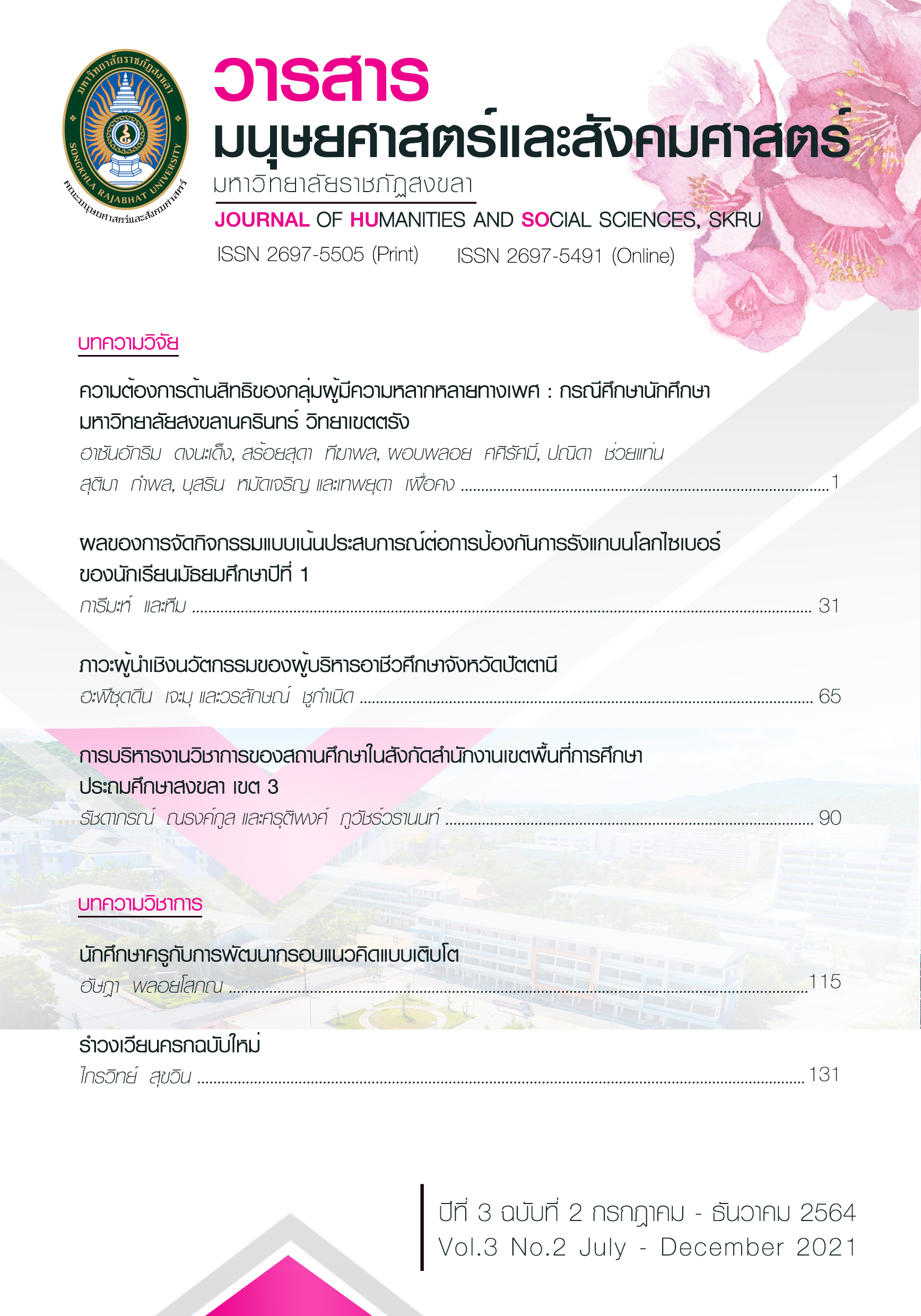STUDENT TEACHERS AND THE DEVELOPMENT OF A GROWTH MINDSET
Main Article Content
Abstract
A mindset is Perspectives on the beliefs of people that affect life both in thinking, attitude and behavior. Having a different mindset will result in many different characteristics. Mindset classifies into two types. The first type is growth mindset and second type is fixed mindset. People having a growth mindset tend to be successful and are able to manage emotions better than people with a fixed mindset. In this paper, authors reviewed research articles and documents concerning the definition, the classifies, the importance, the development principles, and the assessment of the growth mindset. Therefore, it is evident that student teachers today need to be encouraged and developed a conceptual framework for growth to be qualified graduates, consisting of knowledge, skills and good attitudes towards the teaching of the profession. Also, student teachers have the belief that they can change to develop both intelligence and skills and personality. By seeking opportunities for self-improvement at all times Ready to be a quality graduate and a good master teacher in the future for students Helping students who have problems, encouraging suggestions, promoting success in activities.
Downloads
Article Details
ลิขสิทธิ
References
ชัชวาลย์ ศิลปะกิจ, อรวรรณ ศิลปะกิจ และรสสุคนธ์ ชมชื่น. (2558). ความตรงของแบบวัดชุด ความคิด. วารสาร สุขภาพจิตแห่งประเทศไทย: 23(3), 166-174.
เนตรนิยมาศ วรรณพยันต์. (2560). วิถีครูกับการพัฒนากรอบความคิดศิษย์. วารสารหาดใหญ่วิชาการ: 15(2), 158-195.
ปัทมาภรณ์ ศรีราษฎ์. (2561). แนวทางการพัฒนากรอบความคิดแบบเติบโตของครู. วารสารอิเล็กทรอนิกสทาง การศึกษา, 13(1): 389-399.
เรืองวิทย์ นนทภา. (2559). คุณลักษณะของครูที่ผู้เรียนประทับใจ: ต้นแบบของครูดี. วารสารวิชาการ มหาวิทยาลัยฟาร์อีสเทอร์น, 10(2): 142-153.
ศูนย์จิตวิทยาการศึกษา มูลนิธิยุวสถิรคุณ. (2562). การพัฒนากรอบแนวคิด. สืบค้น 18 มีนาคม 2562.
จาก http://www.cepthailand.org.
ศูนย์เทคโนโลยีสารสนเทศและการสื่อสาร สำนักงานปลัดกระทรวง. (2560). Growth Mindset กับการปฏิรูป การศึกษา. สืบค้น 20 มีนาคม 2562. จาก http://www.moe.go.th.
Anderson J. (2017). Growth Mindset Readgins &Support Material. Retrived April 24, 2019. from: https://www.learningnetwork.ac.nz/shared/professionalReading/JAMAND4.pdf.
Bedford S. (2017). Growth mindset and motivation: a study into secondary school science learning. Journal Research Papers in Education, (32)4: 424-443.
Christina Gil. (2016). Teachers Need a Growth Mindset Too. Retrived April 24, 2019 from: https://www.edutopia.org/article/teachers-need-growth-mindset- christina-gil.
Crawford L. and Hagedorn C. (2009). Classroom Discipline. Midwest Independent Publishers Association. The Origins Program, 2009, 304 pages, soft coverISBN: 978-0- 938541-13-4.
Dweck. C. S. (2006). TestYourMindset. Retrived April 24, 2019. from: https://mindsetonline.com.
Dweek, C. S. (2006). เปลี่ยน MINDSET ชีวิตเปลี่ยน. แปลโดย วิโรจน์ ประสิทธิ์วรนันท์. กรุงเทพฯ. อี.ไอ.สแควร์.
Dweek, C. S. (2012). Mindsets and Human Nature: Promoting Change in the MiddleEast, the Schoolyard, the Racial Divide, and Willpower. American Psychologist, 67(8) : 614-622.
Hochanadel A. (2015). Fixed And Growth MindsetIn Education And How Grit Helps Students Persist In The Face Of Adversity. Journal of International Education Research First Quarter 2015, 11(1), 47-50.
Lee, Y. H., Heeter, C., Magerko, B., & Medler, B. (2012). Gaming mindsets: Implicit theories in serious game learning. Cyberpsychology, Behavior, and Social Networking, 15(4): 190–194.
Truax, M. L. (2017). A motivational mindset: How encouraging a growth mindset with students during writing conferences impacts motivation to write (Doctoral dissertation, Judson University).


